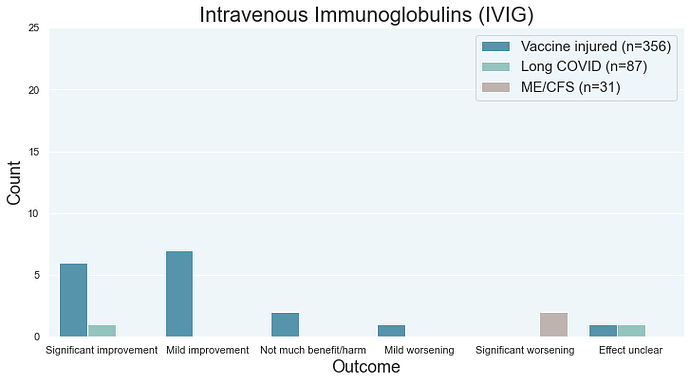IVIG, or IntraVenous ImmunoGlobulins, is an immunomodulating therapy that has been used experimentally for various chronic illnesses such as Long COVID, post-vax, ME/CFS, and PSSD. There are patients, researchers, and clinicians that advocate for IVIG as a treatment for various chronic illnesses. However, there is debate as to whether or not IVIG is effective.
This treatment is very difficult to access due to cost. Patients generally pay for it through insurance. Support groups can help patients ‘doctor shop’ for doctors who can give a relevant diagnosis and to find a doctor comfortable with prescribing IVIG (jumping through the insurance hoops can be a time-consuming process).
Does it work for chronic illness?
There’s data on it post-vax, LC, and ME/CFS patients here: Treatment Outcomes Survey analysis
To understand how to use that page, see this post first.
Of 19 people (with severity data) who tried IVIG, none are mostly recovered AND rated the treatment as leading to significant improvement. However, recovery rates for top treatments are low (e.g. around 4%) and the sample size for IVIG was small.
Many researchers argue that IVIG is a good idea for chronic illness. Avindra Nath of the NIH wants to do more research on immunotherapies like corticosteroids, IVIG, and plasmapheresis. He has published an opinion piece on neurologic issues following vaccine injury. However, while he is a top NIH researcher, he has been accused of fabricating patient outcomes for political reasons (to whitewash vaccine injury). He is the investigator of a NIH/NINDS clinical trial examining the use of IVIG in Long COVID patients (NCT05350774); results were originally expected in 2023 but they have been pushed back to 2024.
There are anecdotal reports from both patients and scientific papers that report success. However, you may quickly realize that there is a ‘everything works’ problem with online support group stories and published ‘scientific’ papers.
Other clinicians who advocate for IVIG include David Younger and Anne Louise Oaklander. See the IVIG approval resources page mentioned earlier. Thompson et al. report that there was “remarkable clinical benefit” in six Long COVID patients treated with IVIG.
PSSD (Post SSRI Sexual Dysfunction)
There is a compilation of recovery stories here. IVIG does not make an appearance on that list although it may not have been popular among PSSD sufferers.
One PSSD anecdote here in an interview with Witt-Doerring Psychiatry: PSSD Patient Rapidly Cured?! | A Follow up interview with Kelli - YouTube
Where to find doctors
What patients generally need is a doctor who likes to prescribe IVIG and is willing to spend time fighting the insurance companies to get it approved for you.
Support groups
The IVIG for V & C19 support group has a list of a few IVIG-prescribing doctors.
SFN support groups may be another place to find out about doctors. (I unfortunately don’t know about all of the IVIG related support groups out there. Ask around on Discord, Facebook, Reddit, etc. See this list for some public support groups.)
Diagnoses
Because IVIG is very expensive, you will probably need insurance to cover it. For that to happen, you will need to navigate the insurance system (many insurers prefer to deny IVIG) and to get a diagnosis that would support treatment with IVIG. I try to maintain some resources at the Long Haul Wiki page on IVIG resources.
Some diagnoses that may be helpful are:
- Autoimmune SFN, Autoimmune Small Fiber Polyneuropathy, etc.
- Autonomic neuropathy
- ?POTS, MCAS? (POTS is fairly common… e.g. your heart rate rises significantly when you go from lying down to standing.)
- Autoimmune dysautonomias
- PANDAS
- ?Myocarditis?
- Sjogren’s
- ITP (Immune thrombocytopenia) ← IVIG is FDA approved for this condition.
- GBS, CIDP (a key symptom is extreme muscle weakness or paralysis)
Positive tests for auto-antibodies against TS-HDS, FGFR3, or MAG may be helpful in providing the autoimmune component of a diagnosis.
- See Emerging autoantibody lab tests - Long Haul Wiki for information on TS-HDS and FGFR3. Due to reagent shortages, you will need to check if testing is available. WUSTL may offer both tests at the moment.
- Anti-Myelin Associated Glycoprotein (MAG) is a fairly conventional auto-antibody test that can be ordered through conventional labs such as LabCorp.
SFN expert list
The website FindExpertMD.com has a list of people who have published papers talking about SFN. You can filter by your state/province. Whereas SFN is an obscure condition that not all neurologists are comfortable with, an autoimmune SFN diagnosis can be used to get insurance approval for IVIG.
